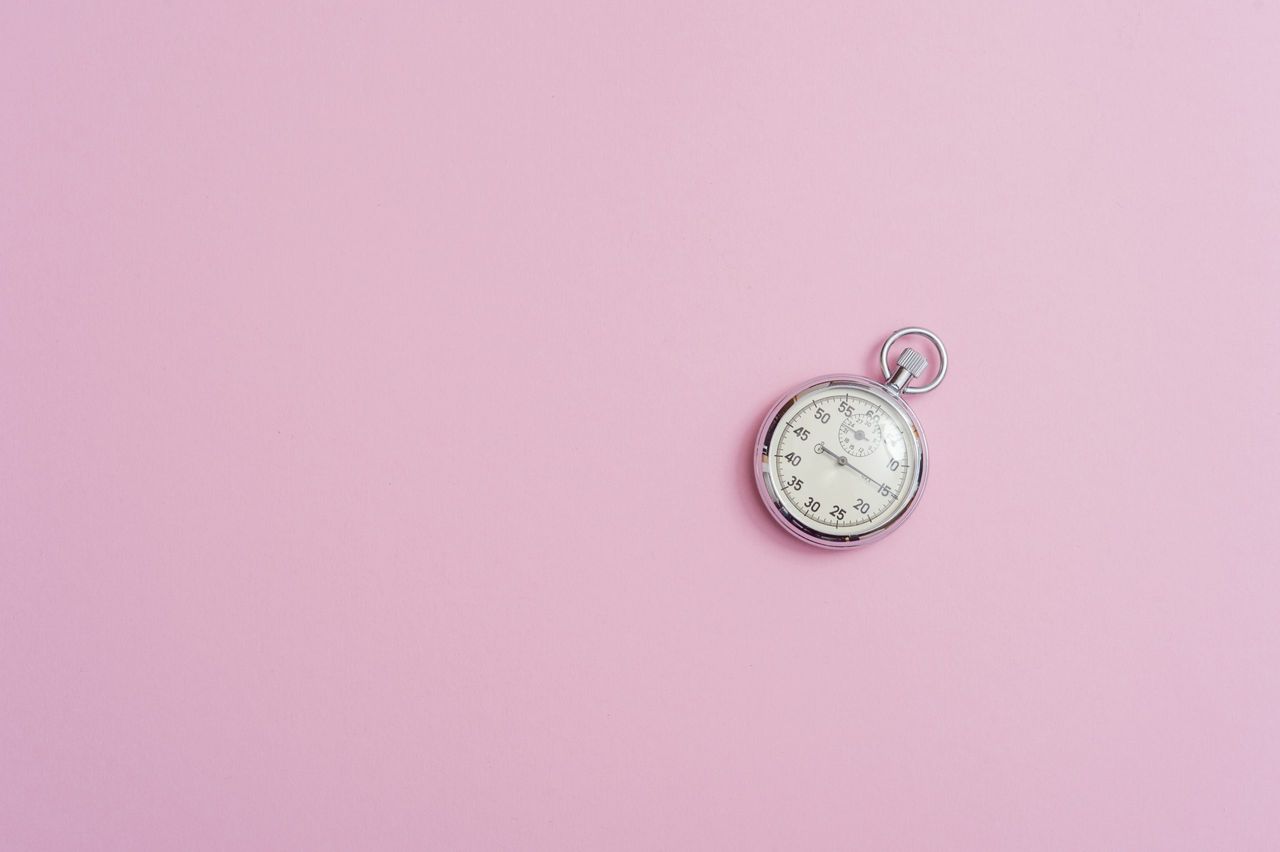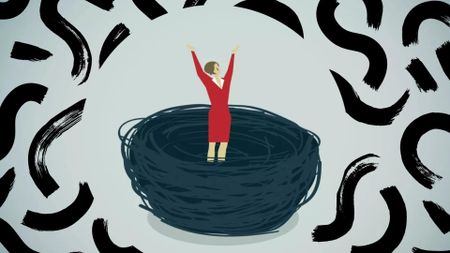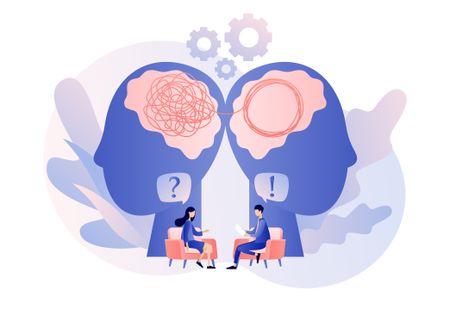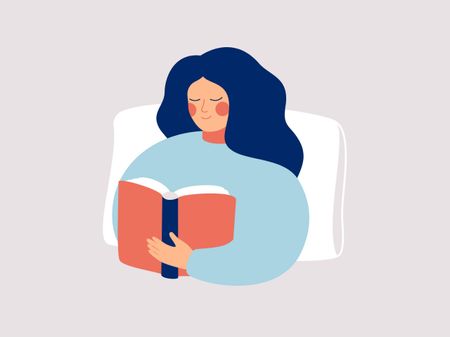This is what hypnotherapy could do for your anxiety levels
Anxiety is usually experienced by less than 10% of the UK population at any given time, but many are finding that their worries are becoming bigger than before.


Many of the people suffering with anxiety, whether through personal stresses like relationships and finances or universal stressors like a pandemic, won’t have considered hypnosis as a solution.
As Susan Hepburn, expert hypnotherapist, puts it, “People think ‘I’m just an anxious person so I [have to] accept it’. No not at all. The number of times I’ve heard that said, 100 per cent you don’t.”
Hypnosis is often portrayed in film and media as sending someone into a trance, but a hypnosis session is about so much more than that. Our experts are here explain exactly how hypnosis can help with anxiety, how it works and whether it could work for you…
How does hypnosis work?
One of the most nerve-wracking things about going for a new treatment is not knowing what to expect. Hypnotherapist and psychotherapist Susan Hepburn, who has helped A-listers such as Adele and Nigella Lawson, tells us how a hypnosis session might work.
1. Working out where anxieties have come from
Susan explains that working out where anxieties have come from is the first step to solving them.
MORE: The simple trick to help you relax in just one minute
Sign up for the woman&home newsletter
Sign up to our free daily email for the latest royal and entertainment news, interesting opinion, expert advice on styling and beauty trends, and no-nonsense guides to the health and wellness questions you want answered.
“I get their story line about their life basically – where the anxieties have come from and how they started out.” She says, “Anxieties sometimes from other people of course, as a reaction to a partner or children or parents. I find out where it came from, when it started out and how when it first happened, if they can recall, they coped with it at the time.”
2. Relaxation
And then she goes on to encourage relaxation. “They just lie down and get nice and comfortable. It takes about seven or eight minutes to relax.”

3. Hypnosis
Unlike what we see in films and television shows there's no swinging watch, or trance-like state to enter.
“When I hypnotise them,” Susan goes on, “I talk about the story line. I take down the anxieties and where they come from. [And] I take those out. It’s like deleting files on a computer; I delete files in that person’s subconscious mind, because no one is pre-destined to have anxieties. It’s impossible. It’s become learned behaviour and that’s where the treatment comes into play, to change those learned behaviour patterns.”
While this might be what happens in regular hypnotherapy sessions, Susan says that she personally goes beyond that.
“I’m going to go one step further and do a clean sweep of your entire subconscious mind, deleting all the links and ties in associating yourself with any form of anxiety. I ask what their achievements are in life and we talk about those. So I say, ‘you’ve achieved XYZ so you’re going to use those same qualities, the same determination to ensure you’re going to have success with this too. My motto is always, ‘failure is not an option and you’ll succeed at this’.”
Although relaxation and identifying anxieties are a common part of hypnosis sessions, each one will be created to suit the individual.
As internationally renowned hypnotherapist, Sheila Granger tells woman&home, “The session is tailored to the person and what their issue is and what they want to achieve. How they want life to be.”
How can hypnosis help anxiety?

Due to the misconceptions around hypnosis in society, many people often go into the practice believing it’s going to be something it isn’t.
Susan clears up what the aim of hypnosis for anxiety is. She says that’s it’s “to be in control of anxieties and emotions, to have no anxiety at all, to get rid of it completely” and, while to some this may sound too good to be true, Susan reiterates that we're not born with anxiety. It's a learned behaviour.
“I always say to everyone, ‘you’re born with self-confidence, self-esteem, self-worth, self-belief’. As you’re growing up through childhood and teenage years, you’re developing all the time through teachers, parents and siblings. But they [the positive feelings about yourself] get chipped away through situations and relationships, trauma, dramas and so on.
“My role is to find those [positive] emotions and bring them to the surface, but [also] to remove the misconceptions about things that have happened and why their anxiety has arisen.”
Susan explains that she takes these misconceptions and anxieties out because “it’s a negative file” and in that way, you can live without anxiety. This idea of upgrading thinking patterns is common across the practice of hypnosis. Sheila says that while hypnosis isn’t suitable for those with serious mental health disorders, like clinical depression, it can be hugely beneficial for those with both general and acute anxiety. In turn, it can help those who struggle with insomnia to sleep better and improve their overall health.
“What hypnotherapy does is it looks to almost upgrade somebody’s thinking about something and more importantly, how somebody reacts to something. With anxiety, it’s mainly about accepting that we cannot change what is happening around us. We have no control over that but we can find a way to control how we react to it and if we do that, it takes us out of a continual flight or fight response.”
But she says this is nothing new. “All the techniques we teach, there’s nothing new. They’re all techniques that professional sports people will use, they will visualise how they want the game to go, how to get rid of the negative self-talk. Every one of us could benefit from that kind of thinking.”
Hypnosis downloads you can try at home

For those who feel anxious about situations might find it difficult to believe that meditative thinking can be a positive step on their way to eradicating anxiety for good.
But as Sheila explains, “Self-hypnosis requires practice and people think if they can’t do it the first time around then it’s not going to be something for me. But as human beings, whatever we practice we become good at.”
Try these hypnosis downloads from home
Mindbox
Mindbox is a website that offers therapy 24/7 for those with a range of mental health issues - from anxiety and panic attacks to stress management.
They "provide the best therapy, in the right place, when you need it the most" via video, audio and journal sessions that you can complete anytime, anywhere and at your own pace. It's a great go-to for instant help and anxiety relief.
MORE: Try Mindbox's relaxation hypnosis, specially recorded for w&h readers
At woman&home, we believe in Mindbox's therapy techniques and believe it's important to access help as soon as you need it. This is why we have partnered with Mindbox to offer you an exclusive discount of up to 50 per cent off their services.
Sheila Granger's Anxiety Release
Our expert, Sheila Granger has a downloadable hypnosis session on her website. It's specifically designed to help deal with anxiety in these troubling times and lasts about 15 minutes.
Headspace
Headspace is available as an app and on your web browser. They have a Guided Imagery practice that focuses on using the senses to create feelings of calm, reduce anxiety and address fears.
Hypnotherapy near me: where to find a local hypnotherapist
If self-hypnosis or guided mediation isn't for you, then it might be time to try finding a local hypnotherapist to you and booking in a session.
The Hypnotherapy Directory can point you in the direction of local therapists to you, taking into consideration what kind of hypnotherapy you want to undertake, whether you want to do it in person or online and what your budget is.
Although traditionally hypnosis isn't available on the NHS, they do suggest that you talk to your GP or ask your local Clinical Commissioning Group about the possibility of treatment.
Alternatively, Mindbox also have a feature called Mindbox Live - a tool to find therapists across many different specialities, who are all available for face-to-face sessions via webcam.
While hypnosis might not work for everyone with anxiety, our experts agree that everyone can learn something from the experience about how they deal with stress and anxiety from hypnosis.

Grace Walsh is woman&home's Health Channel Editor, working across the areas of fitness, nutrition, sleep, mental health, relationships, and sex. She is also a qualified fitness instructor. In 2025, she will be taking on her third marathon in Brighton, completing her first ultra marathon, and qualifying as a certified personal trainer and nutrition coach.
A digital journalist with over seven years experience as a writer and editor for UK publications, Grace has covered (almost) everything in the world of health and wellbeing with bylines in Cosmopolitan, Red, The i Paper, GoodtoKnow, and more.
-
 Trinny Woodall's reveals her top beauty secret – and it works for everyone
Trinny Woodall's reveals her top beauty secret – and it works for everyone"Our fingers can do so much", says the entrepreneur
By Charlie Elizabeth Culverhouse Published
-
 I'm a beauty hoarder, but these simple tricks helped me streamline my makeup bag to just 6 products
I'm a beauty hoarder, but these simple tricks helped me streamline my makeup bag to just 6 productsHere's how to embrace a 'capsule' approach to your beauty stash - per a fellow (but now, former) makeup and skincare maximalist...
By Victoria Jowett Published
-
 How to stop a panic attack, from women who have learned to live with them
How to stop a panic attack, from women who have learned to live with themThree women share how to stop a panic attack from taking over citing their own personal coping strategies
By Lauren Hughes Last updated
-
 How to use mindfulness to destress and appreciate the everyday
How to use mindfulness to destress and appreciate the everydayThese mindfulness tips from The Mindful Manifesto will help you de-stress and re-awaken your sense of being.
By Lauren Hughes Published
-
 5 easy ways to practise mindfulness in your daily life - and the brilliant physical benefits
5 easy ways to practise mindfulness in your daily life - and the brilliant physical benefitsIt can provide a range of benefits.
By Faith Hill Published
-
 How to find a therapist that's right for you and a guide to the different types of talking therapies
How to find a therapist that's right for you and a guide to the different types of talking therapiesIt's an important decision - here are some things it can help to think about...
By Amy Hunt Published
-
 The simple trick to help you relax in just one minute
The simple trick to help you relax in just one minuteWe constantly make time for both friends and family. But when was the last time we made time for ourselves?
By Lauren Hughes Published
-
 Being kind to ourselves can reduce our stress levels - here’s how to practice it more in your daily life, according to a wellbeing expert
Being kind to ourselves can reduce our stress levels - here’s how to practice it more in your daily life, according to a wellbeing expertImportant information during Mental Health Awareness Week, if you're inclined to give yourself a hard time...
By Amy Hunt Published
-
 woman&home and TV's Anna Richardson partner to offer huge discount on online counselling – get private therapy for as little as £33!
woman&home and TV's Anna Richardson partner to offer huge discount on online counselling – get private therapy for as little as £33!Readers can get a brilliant discount of up to 50%!
By Mariana Cerqueira Published
-
 How to unpack your emotions - to make sure you're not suffering from 'compassion fatigue'
How to unpack your emotions - to make sure you're not suffering from 'compassion fatigue'It’s not always easy to recognise that we’re overloaded but knowing what’s weighing you down is the key to a lighter, happier life.
By Amanda Seyderhelm Published